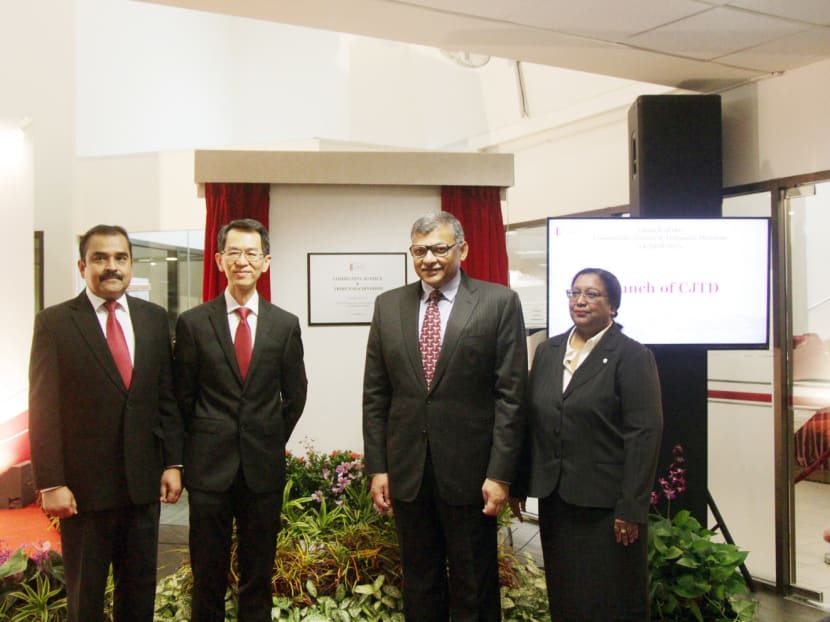More help for accused who cannot afford lawyers: CJ Menon
SINGAPORE — More will be done to help accused persons who cannot afford lawyers to get one at an earlier stage in the criminal justice process, said Chief Justice Sundaresh Menon yesterday, as he reiterated the importance of continually improving accessibility to justice.

Chief Justice Sundaresh Menon (second from right) at the launch of the Community Justice and Tribunals, the State Courts’ new division. Photo: Low Wei Xin
SINGAPORE — More will be done to help accused persons who cannot afford lawyers to get one at an earlier stage in the criminal justice process, said Chief Justice Sundaresh Menon yesterday, as he reiterated the importance of continually improving accessibility to justice.
Speaking at the State Courts’ workplan seminar, he said those who enter the dock without lawyers by their side will “often be at a loss and ... have many unresolved needs for information, advice and support”.
Despite the various legal assistance schemes available, about two out of five State Courts criminal cases at the pretrial stage involve unrepresented accused persons.
In the three initiatives announced by the Chief Justice yesterday to target this problem, the attention was on ensuring lawyers are brought in more for cases that do not go to trial.
For instance, the Guidance for Plea Scheme has been expanded so that pro bono lawyers are assigned to certain cases where the accused person intends to plead guilty.
Judges will identify the types of suitable cases to the Community Justice Centre (CJC) which will then assign lawyers to accused persons, such as those who cannot raise bail, suffer from mental or psychiatric issues, face multiple charges, or face a compulsory or likely jail sentence upon conviction.
Currently, the scheme is only available to those who fail a means test only at the pretrial conference stage.
The Association of Criminal Lawyers in Singapore (ACLS) and Association of Muslim Lawyers will provide these pro bono services.
ACLS president Sunil Sudheesan said the expanded scheme will help accused persons clarify the viability of their defences and, in straightforward matters, advise them to make guilty pleas earlier. “Sometimes, the accused may not be aware of the implications of what they have said (and) those things may jeopardise the outcome of their case,” he said.
Criminal lawyer Josephus Tan, who is a champion of pro bono work, said the move will enhance efficiencies in the legal process.
“It is good to have somebody to handhold the accused persons. The earlier the better,” he said.
Accused persons also need to be advised on the implications of pleading guilty, Mr Tan added. “Sometimes, people don’t understand that the plea must be unconditional,” he said.
The CJC’s executive director Leonard Lee said the Guidance for Plea Scheme has helped resolve 37 cases last year and 21 cases in the first three months of this year.
The other initiative is a pilot to provide legal aid in suitable cases where the defence and prosecution are exploring ways to resolve the matter without a trial.
Lastly, the Primary Justice Project, which currently offers basic legal advice for a fixed fee to parties in divorce matters and civil cases involving low values, will widen its ambit to include criminal cases.
Meanwhile, Chief Justice Menon also launched a new Community Justice and Tribunals Division in the State Courts to oversee community and relational disputes.
The new division, which will be supported by five judicial officers and 29 court administrators, will comprise the Small Claims Tribunals and the upcoming Community Disputes Resolution Tribunals. It will also administer matters and applications under the Protection from Harassment Act that came into effect on Nov 15 last year.
The Community Disputes Resolution Tribunals will be set up in the third quarter of this year and hear cases involving spats between neighbours after other efforts, such as community mediation, have been exhausted.






